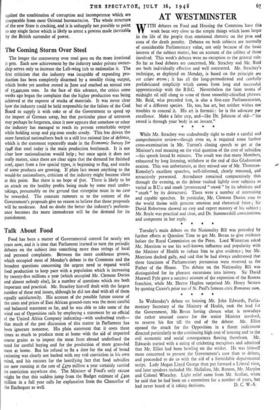Talk About Food
Food has been a matter of Governmental control for nearly ten years now, and it is time that Parliament learned to turn the periodic debates on the subject into something more than strings of local and personal complaints. Between the mere cookhouse grouse, which occupied most of Monday's debate in the Commons and the broadest questions concerning the urgent need to expand world food production to keep pace with a population which is increasing by twenty-five millions a year (which occupied Mr. Clement Davies and almost nobody else), lie a number of questions which are both important and practical. Mr. Strachey himself dealt with the largest number of these real issues, although he did not deal with all of them equally satisfactorily. His account of the possible future course of the costs and prices of East African ground-nuts was the most careful and balanced statement so far, and he was able to take some of the wind out of Opposition sails by employing a statement by an official of the United Africa Company indicating—with undoubted truth— that much of the past discussion of this matter in Parliament has been ignorant nonsense. His plain statement that it costs three times as much to produce meat at home with the aid of imported coarse grains as to import the meat from abroad underlined the need for careful buying and for the production of more grass-fed meat at home. But his refusal to fix a date for the end of bread rationing was clearly not backed with any real conviction in his own mind, and his excuses for the horrifying fact that food subsidies are now running at the rate of £470 million a year certainly carried no conviction anywhere else. The Minister of Food's only excuse might be that this sudden jump from the Budget estimate of L400 million in a full year calls for explanation from the Chancellor of the Exchequer as well.


































 Previous page
Previous page